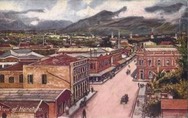I read the story about “Hawaiiʻs Forgotten Hawaiians” on the website Hawaiian Roots. What really happened? I found that a lot of people have written about the subject, but none were able to provide me with a feeling of satisfaction until I read the book Leaving Paradise: Indeigenous Hawaiians in the Pacific Northwest, 1787-1898 written by Jean Barman and Bruce McIntyre Watson, University of Hawaii Press, 2006. Yes, these two authors dedicated themselves to locating these “forgotten Hawaiians” so their descendants may be able to find their roots in Hawaii.
Over a thousand Hawaiians came to the Pacific NW between 1787-1898. Many of these Hawaiians were not recorded by name. However, searching through various records kept by the employers of these Hawaiians and the Catholic Church, the authors were able to stitch together biographies of about 850 Hawaiians and other Polynesians who came to the Pacific NW.
The book is still in publication. I only decided to purchase a used one because it costs less than a new one.
Idaho - Hawaii Connection. A Pacific NW Fur Trapping Expedition.
We found that there is a Hawaii connection in Idaho. There is a County, a river and mountain range called Owyhee. Owyhee is the old English spelling of Hawaii. When James Cook discovered Hawaii in 1778, he found that the islands were inhabited by Native Hawaiians, whom the Anglo-Americans referred to as “Owyhees”. They were noted for their hardy physique and maritime skills. Many “Owyhees” were hired as crew members aboard European and American vessels. Some “Owyhees” sailed to the American Northwest coast and were employed along the Columbia River where they joined fur trapping expeditions or worked at some of the fur trade posts.
In 1819, three Owyhee joined Donald Mackenzie’s Snake expedition that annually went into the Snake country for a Montreal based Canadian fur trading company. The three Owyhees left the main party during the winter of 1819-20 to explore the unknown terrain that later became known as the Owyhee River and mountains. The three Owyhees disappeared and were presumed dead. In memory of these three men the British fur trappers started calling the region “Owyhee”.
Today, that region is an Idaho County called Owyhee, a river called Owyhee, and a mountain range located in Owyhee County, ID and Malheur County, OR.
Links to not-so-in-depth articles on the Internet that discusses the Hawaiians who migrated to work in the Pacific NW follows.
National Park Service, 8 part series by Dr. Edward and Alice Beechert, historians specializing in Hawaiian history: (Please use the following urls to navigate; some of the urls from the parts do not work.)
Hawaiians
Part I - Early Travelers
Part 2 - Emporium of the NW
Part 3 - The Village
Part 4 - Hawaiian Servants
Part 5 - Religion & Education
Part 6 - End of Service: Return or Stay
Part 7 - Changing Times
Part 8 - Conclusion
National Park Service Hawaiians at Fort Vancouver, WA
Publications in the Hawaiian Historical Journals:
Vol. 29 (1995) New Land, New Lives: Hawaiian Settlement in British Columbia by Jean Barman
Vol. 20 (1986) Fur Traders in Hawaiʻi: The Hudsonʻs Bay Company in Honolulu, 1829-1861 by Alexander Poehr (this one will automatically download the pdf to your computer)
Vol. 7 (1973) Kanaka World Travelers and Fur Company Employees, 1785-1860 by Janice K. Duncan (this one you will automatically download the pdf to your computer)
Salt Spring Island Museum, Britsh Columbia
Salt Springʻs Hawaiian Community
Timeline Hawaii to the Pacific NW
First Hawaiian to visit inland NW: 13 Aug 1811, Coxe
Biography of William Naukana
Biography of Maria Mahoi
evols UH Kanaka Pete
—————————————— Updatedd Mar 2018 ——————————————


